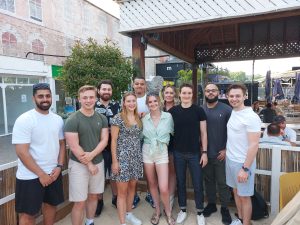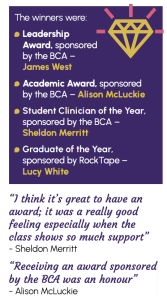Welcoming LSBU graduates to the profession
 Mark Thomas joined London South Bank University (LSBU) in 2018 as a full-time academic and is currently the Professional Lead and Course Director. At LSBU, Mark has been involved in the development and implementation of the MChiro programme, which saw its first cohort of students graduate this summer. We caught up with Mark to talk about what welcoming this new cohort of practising chiropractors means for the profession, the importance of interprofessional working, considerations on working with new graduates and establishing strong employment relationships, as well as the latest developments around LSBU, including their brand-new Croydon campus.
Mark Thomas joined London South Bank University (LSBU) in 2018 as a full-time academic and is currently the Professional Lead and Course Director. At LSBU, Mark has been involved in the development and implementation of the MChiro programme, which saw its first cohort of students graduate this summer. We caught up with Mark to talk about what welcoming this new cohort of practising chiropractors means for the profession, the importance of interprofessional working, considerations on working with new graduates and establishing strong employment relationships, as well as the latest developments around LSBU, including their brand-new Croydon campus.
This year, LSBU sent off its first class of graduating chiropractic students into the profession. This is a big moment for the chiropractic course at LSBU so can you tell us more about it? What can the hiring professionals expect from your new graduates and what would welcoming this new cohort of practising chiropractors mean for the profession?
Yes, this is a really significant moment for LSBU and the profession! The profession can expect a highly motivated and competent cohort of graduates who possess excellent clinical reasoning and manual therapy skills. Due to the opportunity of clinical placements throughout their four years, our graduates have an excellent understanding of the profession and what is required to succeed in clinical practise.

Being the first London-based course, we are offering opportunities to study chiropractic for many students who may not have had the opportunity to join the profession before. The majority of our students are from the London region and therefore reflect the diversity within the capital. The vision of LSBU is to transform lives, communities, businesses and society through applied education and insight. We believe that the MChiro programme is contributing to this vision and, in particular, we look forward to positively impacting the Croydon community as we move to our new home.
We’re picking up that students are keener on interprofessional working based on their experiences when undergoing training. How do you think this will change the profession?
Interprofessional working is fundamental to the development and integration of the profession. Our students are very lucky to be able to learn alongside a number of other healthcare students, including the professions of diagnostic radiography, physiotherapy, sport rehabilitation, occupational therapy and social work. Concepts of interprofessional and collaborative practise are introduced from year one, where students work together to explore key concepts within UK healthcare and then reflect on this experience. This interprofessional learning enables students to understand the role of other professions involved in UK healthcare and develop the skills required to work as an integral part of the team.
 Earlier this year, in June, you presented your students with some special awards, recognising additional achievement in academic excellence, clinical skills and leadership. Please tell us a bit more about this and why LSBU decided to recognise students in this way?
Earlier this year, in June, you presented your students with some special awards, recognising additional achievement in academic excellence, clinical skills and leadership. Please tell us a bit more about this and why LSBU decided to recognise students in this way?
We did and we were very grateful to have sponsorship from the BCA to be able to recognise our students’ achievements. Whilst we are extremely proud of all students in our first cohort qualifying this summer, we looked to further acknowledge the outstanding achievements of a few individuals, based on academic excellence, clinical skill as well as leadership skills and behaviours.
There are more exciting things happening at LSBU. In October last year, LSBU opened a new campus in South London, more specifically in Croydon. Can you tell us more about this in relation to the chiropractic course at the university and what new facilities are available on campus?
Yes, so as of the 2022-2023 academic year, the whole MChiro programme is based at Croydon. In 2021, LSBU decided to open a new campus at Croydon which became home to a number of business and healthcare courses, including chiropractic. The course and clinic are now situated in the heart of Croydon, in between the High Street and East Croydon station. The campus offers more modern study spaces, a full range of library and learning resources and direct access to student services. Not only do we have access to bespoke and larger facilities, including a large rehabilitation suite, but also we have the opportunity to be part of the Croydon healthcare community.
What should the experienced members of the profession, who are currently hiring new graduates, be aware of when doing so? What considerations should they have when working with new graduates and what support should they be able to provide to help new graduates transition smoothly into the profession?
Experienced members of the profession who are looking to hire new graduates need to be aware that, although the students have the competencies to practice as primary healthcare professionals, they obviously have a limited amount of practical experience. Students will therefore require support transitioning into confident and experienced members of the profession. We strongly advocate for all of our students to undertake the PRT scheme, run by the Royal College of Chiropractors, to facilitate their development. However, as previously stated, we feel our graduates have had additional exposure to working within numerous chiropractic settings through their clinical placements and believe this will be of great benefit to their integration into practise.
And with new graduates – what are you telling them about how to get the employee or associate relationship with their employer right from the beginning?
We advise our students on the paramount importance of their first associate role and the influence this can have on their career. Due to the placement model that we have developed, students are able to work within a variety of chiropractic settings, to understand what type of role and team will best match their interests and values. We would also stress to our students the importance of establishing an appropriate working relationship and as such would defer to the employment advice and guidance offered from the professional associations. More specifically, I would recommend this article from the BCA on practice employment advice.


